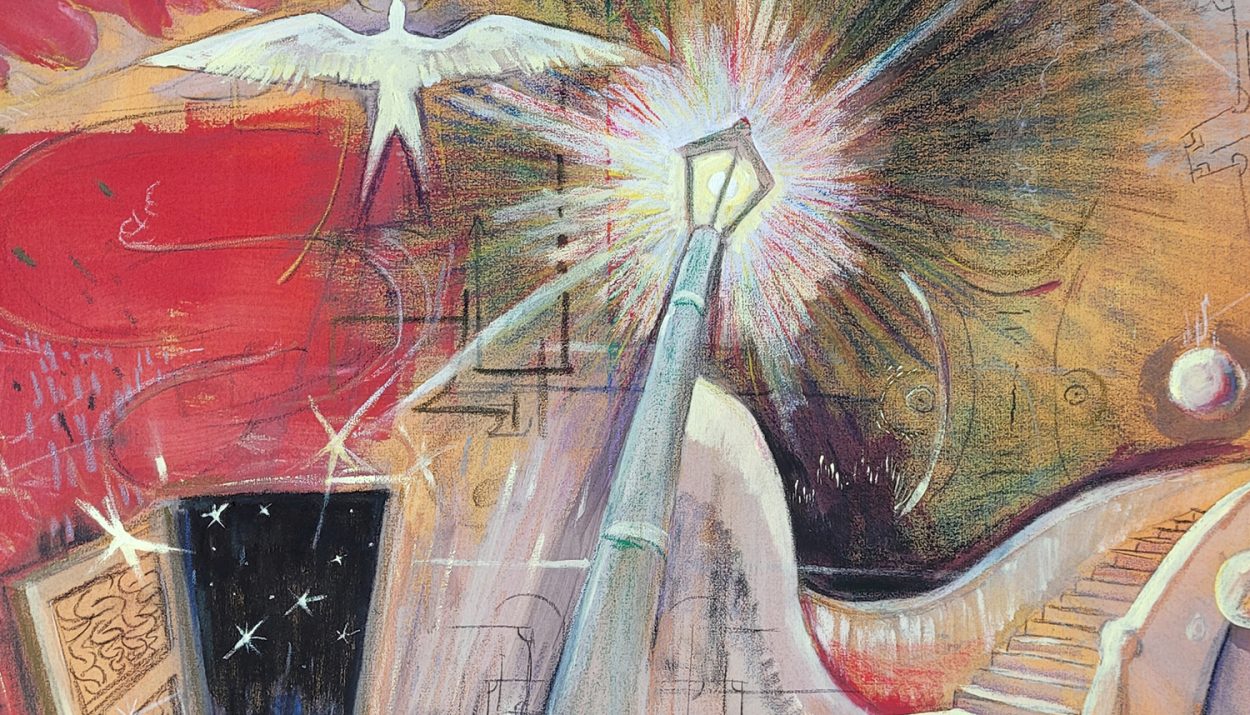From the moment I pressed play on “Your Star Smells Like Mine,” I knew I wasn’t simply listening to an album but stepping into a world that defies convention, where classical elegance meets psychedelic curiosity, and where the boundaries between past, present, and future dissolve into something timeless. Alexander Nantschev, the Vienna-based composer, violinist, and producer, has crafted something beyond just music.
To introduce him in the ordinary way would be a disservice. Nantschev is not merely an artist but an alchemist of sound, weaving classical sensibilities with rock’s raw energy and a surrealist’s poetic eye. His ability to move effortlessly between Vivaldi and The Beatles, between Shostakovich and progressive rock, results in a sonic language entirely his own—what he aptly calls ‘progadelic.’ And with this album, he invites us into this world, a place where philosophy and fever dreams merge, and where the very nature of existence is questioned, challenged, and reimagined.
The opening track, “Cloud Nine,” is both celestial and unhinged, a hypnotic piece that lures you into its surreal embrace with haunting imagery and an almost theatrical descent into madness. The way the singer’s voice shifts—from a delicate, dreamlike croon to a manic chant of “hell six six six”—feels like stepping into a David Lynch film. The instrumentation mirrors this duality, with shimmering harps dissolving into eerie synths, and beats that pulse like an erratic heartbeat. It’s intoxicating, unsettling, and utterly brilliant.
Drawing from Nietzschean musings to craft an interrogation and an epiphany song ,Nantschev delves into existentialism in “Madman.” The way the song asks, “Have you ever heard of the madman seeking god?” feels less like a question and more like a doorway into a labyrinth of thought. The vocals hover between spoken word and melody, while melancholic strings and brooding electronic textures create an atmosphere of eerie introspection. Then, in an unexpected turn, German verses wash over like fragments of a half-remembered dream, adding to the song’s poetic weight.
Talking about the fragility of being in “Made of Glass,” lines like, “We are made of glass, what is lost if we fall?” lingers long after the song ends. There’s something so delicate, so human about the way the singer delivers this meditation on fragility. The minimalistic piano and ethereal strings allow space for every word to breathe, for every pause to hold meaning. The production here is stunning in its restraint, allowing the emotional weight of the song to rest solely on the vocals and the haunting simplicity of its arrangement.
A song of transformation, “Phoenix” is an anthem for those who have burned and risen again. The imagery is breathtaking—“Fly phoenix fly, ride up the sky”—and the vocal delivery soars, shifting from aching vulnerability to triumphant ascent. The orchestration is rich, with sweeping strings and percussion that builds like flames licking at the edges of the melody. The song’s climax feels like catharsis itself, an eruption of sound that mirrors the rebirth it describes.
There’s a deep ache in “Eternity,” a song that grapples with the weight of being earthbound while knowing one is meant to fly. The line “I know I can fly, feel chained on earth” resonates with an almost spiritual intensity. The production here is vast and cinematic, with layered synths and orchestral swells creating a sonic landscape that feels both infinite and deeply personal. The vocals weave between delicate and powerful, embodying the very struggle the lyrics explore.
“Invisible Enemies” feels like falling into a rabbit hole of one’s own mind. The lyrics—“Caught in the spider’s web”—paint a picture of entrapment, of thoughts that refuse to let go. The instrumentation is unsettling in the best way, with brooding synths and dissonant strings creating an almost claustrophobic tension. The vocals shift between exhaustion and panic, mirroring the emotional chaos of the song’s themes. The production leans into an avant-garde, almost cinematic darkness, making it one of the most visceral moments on the album.
One of the most poetic tracks on the album, “Schichten” explores the fleeting nature of love and existence itself. Delivered in German, the lyrics feel like whispered secrets, like glimpses into something profoundly intimate. The instrumentation is subtle yet deeply evocative, with resonant strings and atmospheric synths painting a delicate yet weighted sonic picture. There’s a dreamlike quality to the song, as if each note exists in a space between reality and memory.
With lyrics like “Sunset orange horizons of sadness and hope”, “Tangerine Dreams” captures the strange beauty of nostalgia, the way joy and melancholy intertwine. The production is lush, layering ambient textures with pulsing rhythms that lull you into a meditative state. The vocals drift like a whisper, pulling you into this hazy, hypnotic world where past and present blur. It’s a song that lingers, like the afterglow of a fading sun.
“Walking Without Walking” is movement in its purest form. The lyrics paint a surreal journey—ascending mountains, playing the violin with reckless abandon—and the music mirrors this sense of restless exploration. The violin, in particular, is strikingly expressive, cutting through the layered production like a heartbeat driving the narrative forward. The song feels both weightless and urgent, a perfect encapsulation of its themes of escape and transformation.
Closing the album with a cosmic whisper, “Space Mussel” is perhaps the most surreal moment in Your Star Smells Like Mine. The lines “Why not you lovely robot. Stay human & blue” feel like poetry from another world, and the music follows suit. Shimmering synths, glacial strings, and pulsating rhythms create a soundscape that feels both alien and intimate. The violin sings like a voice from the past, grounding the track’s ethereal drift. It’s a mesmerizing finale, a moment where time and sound seem to dissolve into something infinite.
Overall, “Your Star Smells Like Mine” is not an album that fits into a neat category—it is a universe unto itself. Alexander Nantschev has taken the traditions of classical composition and the fearless experimentation of rock and woven them into something both deeply personal and profoundly universal. The instrumentation is masterfully layered, each note placed with intention, each pause carrying weight. This is not music for passive listening—it demands to be felt, to be experienced. It is a journey, a fever dream, a philosophical musing set to sound. And in the end, it leaves you changed.
Listen to the “Your Star Smells Like Mine” album on Spotify
Follow Alexander Nantschev here for more information






